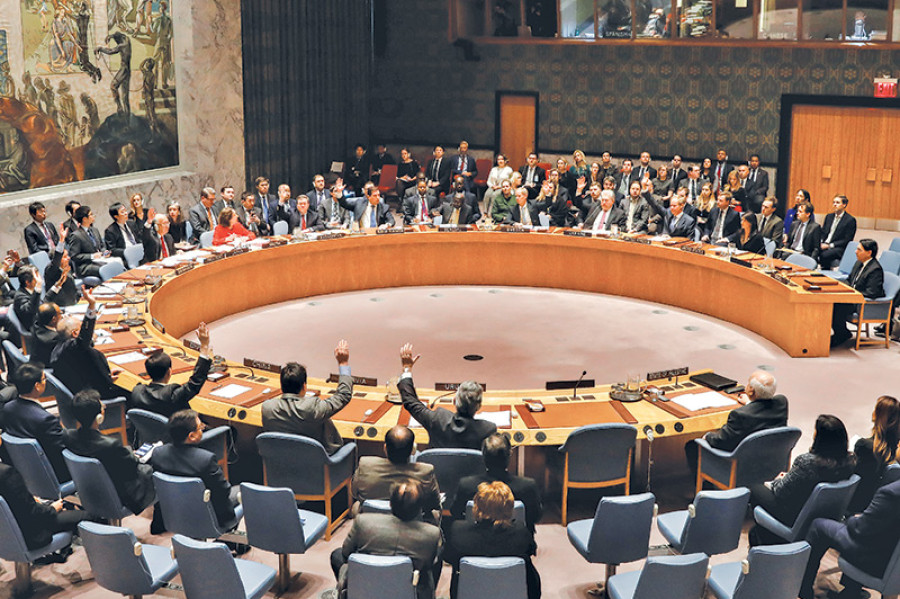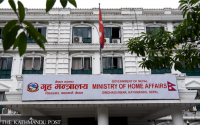National
UNGA vote ‘consistent with Nepal’s position on Israel, Palestine’
Nepal’s decision to vote in favour of a United Nations General Assembly resolution criticising the US decision to recognise Jerusalem as Israel’s Capital was “consistent with” the country’s historic position on Israel and Palestine and not exactly against the United States, Nepali officials have said.
Anil Giri
Nepal’s decision to vote in favour of a United Nations General Assembly resolution criticising the US decision to recognise Jerusalem as Israel’s Capital was “consistent with” the country’s historic position on Israel and Palestine and not exactly against the United States, Nepali officials have said.
Nepal voted alongside 127 other countries of the UNGA on US President Donald Trump’s decision to shift the US Embassy from Tel Aviv to Jerusalem of Israel. The resolution was jointly sponsored by Yemen and Turkey.
Amid fears of aid cut as threatened by President Trump and US Ambassador to UN Nikki R Haley ahead of, and after, the vote, Nepali officials in Kathmandu dismissed the remarks saying that they would not be true given the “strong” relations between Nepal and the United States.
“We will remember it when we are called upon once again to make the world’s largest contribution to the United Nations,” Haley said of the vote.
“And we will remember when so many countries come calling on us, as they so often do, to pay even more and to use our influence for their benefit.”
Nepal and the US signed the Millennium Challenge Corporation Compact three months ago on mobilisation of a $500 million grant for improving availability of electricity, strengthening infrastructure, and building regional connectivity. The government of Nepal will contribute an additional $130 million to the project, bringing the total investment to $630 million.
US officials in Kathmandu did not return the message and calls by the Post to enquire if there was any plan to cut aid to Nepal in the near future. Though the MCC agreement was signed during Trump’s presidency, Nepal had already been chosen for this during the presidency of Barack Obama.
According to US Ambassador to Nepal Alaina B Teplitz, while Nepal is making progress in this area (corruption control), the most recent MCC scorecard showed a significant decline from the previous year—in fact Nepal showed the biggest decline in terms of corruption control of any country assessed. To combat this, it was up to the government of Nepal to demonstrate its commitment to accountability and transparency—or the Compact, under the terms of “our agreement, will grind to a halt”, she said earlier this week.
In her recent remarks while marking the 70 years of Nepal-US bilateral relations, she had said, “It is my hope our partnership of the next 70 years is dynamic, innovative, and supportive of our mutually held values. Even without my crystal ball, I know we will be able to work effectively with the new government to support an evolution of the US-Nepal relationship.”
The UN resolution was forwarded with consent from close US allies Britain, France, Italy, Spain, Germany, Japan, Saudi Arabia, Jordan and Egypt.
The resolution is not very strong, said a senior Foreign Ministry official. Neither did it pinpoint the United States. “This is a combo resolution passed by the UN Security Council and other UN platforms in the past, which is again consistent with our policy on Israel and Palestine.”
Nepal holds that both Israel and Palestine should maintain “peace and security” in the globally recognised international border. “One should be clear that Nepal did not vote against the US. We have only upheld our consistent policy,” said Foreign Ministry Spokesperson Bharat Raj Poudyal.
There will be strong pressure from the US Congress if the Trump administration cuts aid to Nepal, said Suresh Chalise, Nepal’s former ambassador to the US.




 8.99°C Kathmandu
8.99°C Kathmandu














